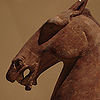- Three Lords and Nine Ministers
-
The Three Lords and Nine Ministers system (Chinese: 三公九卿) was a central administrative system adopted in ancient China that was officially instituted in Qin Dynasty (221 BC - 206 BC) and was replaced by the Three Departments and Six Ministries system (Chinese: 三省六部) since Sui Dynasty (589-618 AD).
Three Lords referred to three highest rank officials in the imperial government, namely,
- the Chancellor (Chengxiang),
- the Imperial Secretary (Yushidaifu),
- the Grand Commandant (Taiwei).
Nine Ministers comprised all the ministers of importance in the central government. They were:
- the Minister of Ceremonies (Taichang),
- the Supervisor of Attendants (Guangluxun),
- the Commandant of Guards (Weiwei),
- the Minister of Coachman (Taipu),
- the Commandant of Justice (Tingwei),
- the Grand Herald (Dahonglu),
- the Director of the Imperial Clan (Zongzheng),
- the Grand Minister of Agriculture (Dashinong),
- the Small Treasurer (Shaofu).[1]
Contents
History
See also
Notes
- ^ Wang, 150-151.
References
- Li, Konghuai (2007) (in Chinese). History of Administrative Systems in Ancient China. Joint Publishing (H.K.) Co., Ltd.. ISBN 978-962-04-2654-4.
- Lu, Simian (2008) (in Chinese). The General History of China. New World Publishing. ISBN 978-7-80228-569-9.
- Wang, Yü-Ch'üan (June 1949). "An Outline of The Central Government of The Former Han Dynasty". Harvard Journal of Asiatic Studies (Harvard Journal of Asiatic Studies, Vol. 12, No. 1/2) 12 (1/2): 134–187. doi:10.2307/2718206. JSTOR 2718206.
Han Dynasty topics History Chu-Han contention · Feast at Hong Gate · Lü Clan Disturbance · Sino-Xiongnu War · Rebellion of the Seven States · Sino-Roman relations · Xin Dynasty · Chimei · Goguryeo–Han Wars · First Chinese domination of Vietnam · Second Chinese domination of Vietnam · Disasters of Partisan Prohibitions · Way of the Five Pecks of Rice · Yellow Turban Rebellion · End of Han
Society and culture Government Three Lords and Nine Ministers (Nine Ministers · Three Ducal Ministers) · Four Commanderies · Protectorate of the Western Regions (Chief Official) · List of emperors of the Han DynastyEconomics Science and technology Categories:- Government of Imperial China
- Chinese history stubs
- Government stubs
Wikimedia Foundation. 2010.
